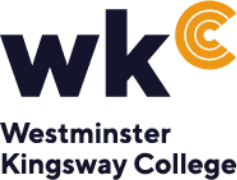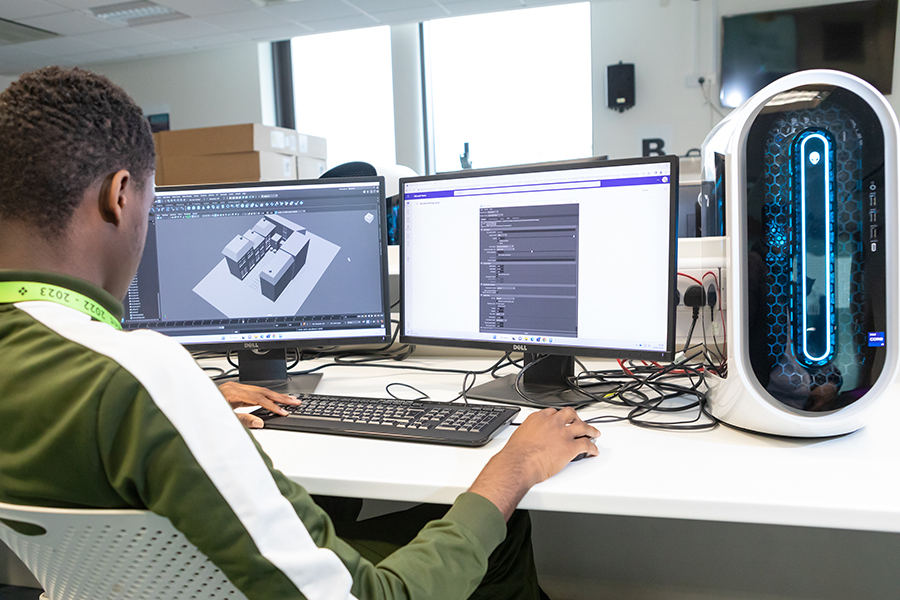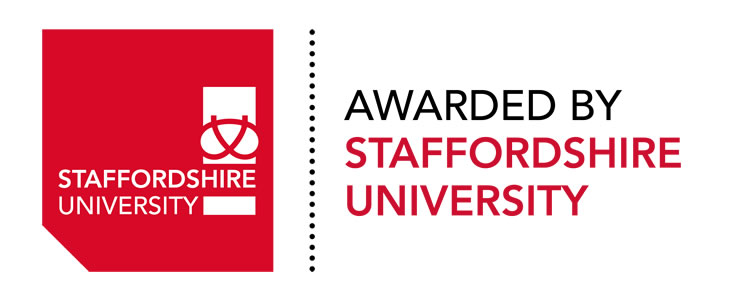
Cyber Security BSc (Hons) - With A Foundation Year (Staffordshire University)



ABOUT THE COURSE
This course is awarded by Staffordshire University.
This course sets out to create graduates who are at the forefront of the Cyber Security sector both theoretically and practically. This will be evident to students immediately with the distinctive facilities we have and use at the university, including a dedicated, self-contained laboratory, with its private internal network, containing some of the latest equipment and software.
With access to external specialists from the Police and industry both for guest lectures and Q&A sessions, the version of EnCase that is used in the lab is the version used by law enforcement. We are equipped to perform both ‘PC’ based investigations, as well as mobile forensics (smartphones, Sat Navs etc).
There is also the opportunity for industry-recognised certifications in EnCase, MicroSystemation XRY and Cellebrite UFED as well as a variety of placement opportunities, ranging from SMEs, both local and nationwide, large international/multinational organisations, and the Police and Government Security Agencies.
The Department of Computing at Staffordshire University has an international reputation for outstanding teaching and development of computing professionals with long-established relationships with leading companies in the computing industry and strives to bring in external speakers and those from the industry to provide differing viewpoints of the Computer Science discipline. Their London campus is benefiting from a significant investment in technology and resources for students studying cybersecurity and other computer science-related fields.
The first year, or Foundation Year, will be delivered at our Westminster Kingsway Soho Centre. Students will benefit from a combined teaching program where Staffordshire University London academics will co-deliver some modular content. Learning visits to the Staffordshire University London campus during the Foundation Year are embedded within the curriculum.
This course is designed with input from Google, Amazon, and Cisco. In some modules, you can elect to study for certifications from Amazon, Cisco, or Microsoft (you will be advised as to which certifications you can study as you progress through your course).
The course is a validated Staffordshire University undergraduate program. There are opportunities to gain Amazon Web Services (AWS) and Cisco certifications.
WHAT WILL I STUDY?
Foundation Year Core Modules
- Study Skills and Professional Development
- Web Technology and Programming
- Networks, Statistics and Probability
- Group Project
Year 1 Core Modules
- Software Development and Application Modelling
- Digital Technologies
- Networking Concepts and Cyber Security
- Web Development and Operating Systems
Year 2 Core Modules
- Commercial Computing
- Ethical Hacking
- Cyber Operations and Network Security
- Cyber Security
Year 3 Core Modules
- Final Year Project,
- Advanced Forensic Computing
- IT Infrastructure Security
- Operating Systems Internals and Biometrics
Find out more about years 1-3 at Cyber Security - Staffordshire University London (staffslondon.ac.uk)
WHAT WILL I NEED?
- UCAS Tariff - 48 points
or
- A level - CE
or
- Pearson BTEC Level 3 National Extended Diploma (first teaching from September 2016) - PPP
Additional support
Our Student Inclusion Services support students with additional needs such as sensory impairment, or learning difficulties such as dyslexia.
For information on our Higher Education policies including admissions, fees, and student contracts, please see the links below:
- Admissions Policy
- Complaints Policy
- Equality, Diversity and Inclusion Policy
- Fees Policy
- HE Student Contract
- Student Protection Plan
For our full list of policies, governance and fees please see our website Capital City College Group (capitalccg.ac.uk).
HOW WILL I BE ASSESSED?
This course has integrated theoretical, technical, and practical modes of study. This means the theoretical underpinning is taught alongside the technical knowledge, with a heavy emphasis on practical elements of cyber security.
Assessment is based mainly on coursework, accompanied by a small number of exams. We find this is the best way to assess the integrated approach to theory and practice that you’ll engage in. Your coursework carried out in response to assignments, project briefs or self-initiated proposals, will be presented in many forms such as practical computing artefact portfolios, word-processed reflective evaluations, essays and case studies. Your approach to the coursework for a given module should be individual and distinctive. Tutors see this work throughout its development thus forming a one-to-one professional working relationship with you throughout each module. Formative assessment is carried out in tutorial and feedback is usually provided to you orally, with a written record kept either by the tutor and/or yourself. This is sometimes produced as the result of peer- or self-assessment exercises.
Foundation year
- 50% Practical exams
- 38% coursework
- 13% written exams
Year 1
- 8% practical exams
- 70% coursework
- 23% of written exams
Year 2
- 13% practical exams
- 74% coursework
- 13% written exams
Year 3
- 100% coursework
Feedback
Your course will provide you with opportunities to test your understanding of your subject informally (through formative feedback) before you complete the formal assessments. Each module normally includes practice or ‘formative’ assessments for which you receive feedback from your tutor. Practice assessments are developmental and any grades you receive for them do not count towards your module mark but are essential for you to develop academically as a student.
There is a formal or ‘summative’ assessment at the end of each module and the grades from formal assessments count towards your module mark. You will normally receive feedback on coursework assessments within 20 working days following the date of submission. The feedback you receive will help to focus you to achieve better grades on the next set of modules you study.
WHAT WILL IT COST?
Adults - Higher Education
You must pay fees to study a Higher Education (HE) course. If you have not studied one previously, you may be eligible to apply for an HE loan. Other financial support such as maintenance loans and disability support are also available.
Please see here for the documents you will need to show us.
Some courses will have other associated costs, such as for specialist materials and trips. Many of our students are eligible for financial support, see here for details.
Tuition Fees: £9,250 per year of study (full-time)
WHAT CAN I DO AFTER?
Successful completion of this degree can lead to a wide rane of jobs in computing. For example:
- Chief Information Security Officer
- Forensic Computer Analyst
- Information Security Analyst
- Penetration Tester
- Security Architect
- IT Security Engineer
- Security Systems Administrator
- IT Security Consultant
MEET SOME OF THE TEACHERS
Mehmet is highly trained with an MSc in Business Information Technology from Middlesex University, London, a PGCE in Post Compulsory Education and Training, from Greenwich University, London, and a City and Guilds Level 5 Subsidiary Diploma in Teaching Mathematics, London.
Before joining Westminster Kingsway College, Mehmet worked in various educational organisations as an ICT Tutor and Lecturer. For instance, he worked in Ealing, Hammersmith, and West London College for 13 academic years and delivered several ICT-related qualifications like Functional Skills in ICT and Mathematics/ Numeracy, GNVQ in ICT, BTEC in ICT, A Level in ICT and a HNC/HND in Computing.
Mehmet joined Westminster Kingsway College’s Soho Centre in October 2017 delivering Functional Skills in ICT and Mathematics courses. Mehmet also worked for a year at City and Islington College where he delivered a BTEC National in ICT.
In 2022, Mehmet moved to the Westminster Kingsway Kings Cross Centre to deliver a joint access course (Foundation degree course) with Staffordshire University, and BTEC National in ICT course, and an AS level in Computing course, where he continues to provide excellent teaching to his students.
The teachers listed may change, these shown are an example of the teachers who teach on these programmes.

